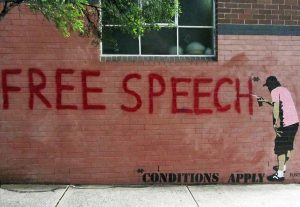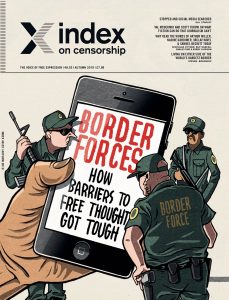16 Oct 2019 | News, Spain, Student Reading Lists
The Spanish Supreme Court has jailed nine Catalan separatist leaders for their roles in the independence referendum in 2017, deemed illegal by the Spanish government. Oriol Junqueras, former vice president of Catalonia, was sentenced to 13 years, the highest sentence handed out. A new international arrest warrant for former Catalonia President Carles Puigdemont, who fled to Belgium, has been issued. As protesters clash with police on the streets of Barcelona over the sentencing, Index looks back on the struggle for freedom of expression in Spain and particularly Catalonia, from the last years of General Francisco Franco’s regime, to the present.
Poems from Catalonia vol 1, 2 1972
https://journals.sagepub.com/doi/pdf/10.1080/03064227208532183
Joan Brossa, born in 1919, wrote poetry about Franco’s invasion and destruction of independent Catalonia during the Spanish Civil War (1936-1939). His works are allegories about the bitterness over the cultural repression in Catalonia under Franco. However, the allegories were too transparent to avoid censorship by the Spanish authorities. Index acquired copies of some of the censored poems.

Weekly meeting to remember Franco’s victims in the Puerta del Sol, Madrid [Image credit: NathaliePaco – Demotix]
https://journals.sagepub.com/doi/pdf/10.1080/03064227408532323
The final years of Franco’s regime saw a confused attitude towards censorship. Franco wanted to outwardly present a degree of liberalism to the international political community, while still enforcing censorship inwardly. John Butt argued that this may be why right-wing extremists suppressed artists and thinkers and got away with it; the government allowed these groups to do their dirty work. Vigilantes poured acid over some of Picasso’s works and threw bricks through bookshop windows. The police did not charge them. It was a period of haphazardly applied censorship, creating an atmosphere of insecurity for Spanish writers.
Spanish journalists in jeopardy vol 9,6 1980
https://journals.sagepub.com/doi/pdf/10.1080/03064228008533131
Even in post-Franco Spain, there were significant threats to freedom of expression for journalists. The 1978 constitutional guarantee of press freedom proved to be a formality, not upheld in practice. In May 1980, 60 journalists, writers and artists faced court action, with offenses including “outrage to public morals”. Juan Luis Cebrian, the author of this article, was the editor of the Madrid daily newspaper El Pais. He was sentenced to three months in prison for an editorial, published two years prior in 1978, in which he defended freedom of expression. Read about his experiences here.
Shifting an elephant – freedom of expression in spain today vol 11, 3 1982
https://journals.sagepub.com/doi/pdf/10.1080/03064228208533377
In the first two years after Franco’s death there was excitement about the new democracy, as many newspapers and magazines were set up. But in a bid to pacify Francoists, laws remained in place that allowed journalists to be targeted. Offenses included insult or disrespect to the army and the royal family. In 1977 anti-terrorist legislation was brought in, which failed to define “apology” for terrorism. This left it open to abuse by those wishing to penalise journalists. Read Malcolm Coad’s article from this pivotal point in Spanish history here.
Puppet state vol 46,1 2017
https://journals.sagepub.com/doi/full/10.1177/0306422017703623
Spanish puppeteers Raúl García Pérez and Alfonso Lázaro de la Fuente were arrested in 2016 for glorifying terrorism. The evidence against them was the content of puppet show Pérez and Lázaro de la Fuente were performing as part of carnival festivities in Madrid. The show had included a character holding a banner displaying the name of a fictional terrorist organisation. Lázaro de la Fuente told Index about his experiences following his arrest, and discussed the consequences of performers being persecuted for their art in modern Spain.
No laughing matter vol 46, 2 2017
https://journals.sagepub.com/doi/full/10.1177/0306422017716058
Silvia Nortes explored the reforms the Spanish political party, the Partido Popular, pushed through which allowed the prosecution of comedians, journalists and social media users, quashing their right to freedom of expression. Nortes cites several examples of comedians who have been prosecuted and even jailed. Read their jokes here.
They can’t stop the music vol 46,4 2017
https://journals.sagepub.com/doi/full/10.1177/0306422017748822
Cesk Freixas, a musician and member of Popular Unity Candidacy, a pro-Catalonia independence party, has drawn the attention of the ruling Partido Popular. Unhappy with his strong pro-independence message, they attempted to have his shows cancelled.
Freixas, who performs in Catalan, told Index he has been accused, among other things of “boasting the Catalan language”. Singer-songwriter Albert Pla has also faced discrimination for championing independence for Catalans. Read more about censorship of the independence movement here.
30 Sep 2019 | Events
[vc_row][vc_column][vc_column_text]

Image: Copyright 2011, Newtown Grafitti
[/vc_column_text][/vc_column][/vc_row][vc_row][vc_column][vc_column_text]Manchester Central : Exchange 4
Threats to Free Speech
This event will explore the panoply of challenges to freedom of speech in the UK.
Katy Balls, deputy political editor at The Spectator, will chair this event.
Participants include: Index head of advocacy Joy Hyvarinen, Martha Spurrier, director of Liberty; John Whittingdale MP[/vc_column_text][/vc_column][/vc_row]
12 Sep 2019 | Magazine, Magazine Contents, Volume 48.03 Autumn 2019

Border forces – how barriers to free thought got tough
The autumn 2019 Index on Censorship magazine looks at how borders are getting tougher, journalists are being stopped, visas refused and border officials are snooping into our social media profiles and personal messages. Nations are looking to surveil our thoughts before allowing us to come into their countries and so limiting freedom of expression and the free flow of ideas.
In this issue Steven Borowiec reports from South Korea about how the law means that you can be prosecuted for contacting your relatives in the north without permission; Meera Selva looks at how internet shutdowns are being used round the world to prevent people communicating, most recently in Kashmir; Mark Frary gives tips for LGBT people on how to protect themselves when crossing borders into countries where they might face discrimination. Charlotte Bailey and Jan Fox look at how it is getting tougher in the UK and USA for artists, writers and academics to get visas; and Kaya Genç digs into Turkey’s censorship of the internet. In the rest of the magazine, writers Emilie Pine, Elif Shafak and Kerry Hudson, and theatre director Nicholas Hytner reflect on past famous Index contributors, Václav Havel, Nadine Gordimer, Samuel Beckett and Arthur Miller. We have an extract of the script of the 1977 film Le Camion by Marguerite Duras which has never appeared in English before, and poems by taboo-breaking poet Dean Atta and the Liverpool Poet Brian Patten. We also have an extract of a story by censored Chinese writer Chen Xiwo about a mother and her daughter and their abusive relationship. Plus Index magazine’s first ever crossword by Herbashe.
[/vc_column_text][/vc_column][/vc_row][vc_row][vc_column][vc_custom_heading text=”Special Report: Border forces: how barriers to free thought got tough”][/vc_column][/vc_row][vc_row][vc_column][vc_column_text]Big brother at the border by Rachael Jolley
Switch off, we’re landing! by Kaya Genç Be prepared that if you visit Turkey online access is restricted
Culture can “challenge” disinformation by Irene Caselli Migrants trying to cross the Mediterranean to Europe are often seen as statistics, but artists are trying to tell stories to change that
Lines of duty by Laura Silvia Battaglia It’s tough for journalists to visit Yemen, our reporter talks about how she does it
Locking the gates by Jan Fox Writers, artists, academics and musicians are self-censoring as they worry about getting visas to go to the USA
Reaching for the off switch by Meera Selva Internet shutdowns are growing as nations seek to control public access to information
Hiding your true self by Mark Frary LGBT people face particular discrimination at some international borders
They shall not pass by Stephen Woodman Journalists and activists crossing between Mexico and the USA are being systematically targeted, sometimes sent back by officials using people trafficking laws
“UK border policy damages credibility” by Charlotte Bailey Festival directors say the UK border policy is forcing artists to stop visiting
Ten tips for a safe crossing by Ela Stapley Our digital security expert gives advice on how to keep your information secure at borders
Export laws by Ryan Gallagher China is selling on surveillance technology to the rest of the world
At the world’s toughest border by Steven Borowiec South Koreans face prison for keeping in touch with their North Korean family
Stripsearch by Martin Rowson Bees and herbaceous borders
Inside the silent zone by Silvia Nortes Journalists are being stopped from reporting the disputed north African Western Sahara region
The great news wall of China by Karoline Kan China is spinning its version of the Hong Kong protests to control the news
Kenya: who is watching you? by Wana Udobang Kenyan journalist Catherine Gicheru is worried her country knows everything about her
Top ten states closing their doors to ideas by Mark Frary We look at countries which seek to stop ideas circulating[/vc_column_text][/vc_column][/vc_row][vc_row disable_element=”yes”][vc_column][vc_custom_heading text=”Global View”][vc_column_text]Small victories do count by Jodie Ginsberg The kind of individual support Index gives people living under oppressive regimes is a vital step towards wider change[/vc_column_text][/vc_column][/vc_row][vc_row][vc_column][vc_custom_heading text=”In Focus”][vc_column_text]Germany’s surveillance fears by Cathrin Schaer Thirty years on from the fall of the Berlin wall and the disbanding of the Stasi, Germans worry about who is watching them
Freestyle portraits by Rachael Jolley Cartoonists Kanika Mishra from India, Pedro X Molina from Nicaragua and China’s Badiucao put threats to free expression into pictures
Tackling news stories that journalists aren’t writing by Alison Flood Crime writers Scott Turow, Val McDermid, Massimo Carlotto and Ahmet Altan talk about how the inspiration for their fiction comes from real life stories
Mosul’s new chapter by Omar Mohammed What do students think about the new books arriving at Mosul library, after Isis destroyed the previous building and collection?
The [REDACTED] crossword by Herbashe The first ever Index crossword based on a theme central to the magazine
Cries from the last century and lessons for today by Sally Gimson Nadine Gordimer, Václav Havel, Samuel Beckett and Arthur Miller all wrote for Index. We asked modern day writers Elif Shafak, Kerry Hudson and Emilie Pine plus theatre director Nicholas Hytner why the writing is still relevant
In memory of Andrew Graham-Yooll by Rachael Jolley Remembering the former Index editor who risked his life to report from Argentina during the worst years of the dictatorship[/vc_column_text][/vc_column][/vc_row][vc_row][vc_column][vc_custom_heading text=”Culture”][vc_column_text]Backed into a corner by love by Chen Xiwo A newly translated story by censored Chinese writer about the abusive relationship between a mother and daughter plus an interview with the author
On the road by Marguerite Duras The first English translation of an extract from the screenplay of the 1977 film Le Camion by one of the greatest French writers of the 20th century
Muting young voices by Brian Patten Two poems, one written exclusively for Index, about how the exam culture in schools can destroy creativity by the Liverpool Poet
Finding poetry in trauma by Dean Atta Male rape is still a taboo subject, but very little is off-limits for this award-winning writer from London who has written an exclusive poem for Index[/vc_column_text][/vc_column][/vc_row][vc_row][vc_column][vc_custom_heading text=”Column”][vc_column_text]Index around the world: Tales of the unexpected by Sally Gimson and Lewis Jennings Index has started a new media monitoring project and has been telling folk stories at this summer’s festivals[/vc_column_text][/vc_column][/vc_row][vc_row][vc_column][vc_custom_heading text=”Endnote”][vc_column_text]Endnote: Macho politics drive academic closures by Sally Gimson Academics who teach gender studies are losing their jobs and their funding as populist leaders attack “gender ideology”[/vc_column_text][/vc_column][/vc_row][vc_row][vc_column width=”1/3″][vc_custom_heading text=”Subscribe”][vc_column_text]In print, online, in your mailbox, on your iPad.
Subscription options from £18 or just £1.49 in the App Store for a digital issue.
Every subscriber helps support Index on Censorship’s projects around the world.
 SUBSCRIBE NOW[/vc_column_text][/vc_column][vc_column width=”1/3″][vc_custom_heading text=”Read”][vc_column_text]The playwright Arthur Miller wrote an essay for Index in 1978 entitled The Sin of Power. We reproduce it for the first time on our website and theatre director Nicholas Hytner responds to it in the magazine
SUBSCRIBE NOW[/vc_column_text][/vc_column][vc_column width=”1/3″][vc_custom_heading text=”Read”][vc_column_text]The playwright Arthur Miller wrote an essay for Index in 1978 entitled The Sin of Power. We reproduce it for the first time on our website and theatre director Nicholas Hytner responds to it in the magazine
READ HERE[/vc_column_text][/vc_column][vc_column width=”1/3″][vc_custom_heading text=”Listen”][vc_column_text]In the Index on Censorship autumn 2019 podcast, we focus on how travel restrictions at borders are limiting the flow of free thought and ideas. Lewis Jennings and Sally Gimson talk to trans woman and activist Peppermint; San Diego photojournalist Ariana Drehsler and Index’s South Korean correspondent Steven Borowiec
LISTEN HERE[/vc_column_text][/vc_column][/vc_row]
10 Sep 2019 | Mexico, News, North Korea, South Korea, United Kingdom, United States, Volume 48.03 Autumn 2019
In the Index on Censorship autumn 2019 podcast, we focus on how travel restrictions at borders are limiting the flow of free thought and ideas. Lewis Jennings and Sally Gimson discuss the latest issue of the magazine and reveal what to expect. Guests include trans woman and activist Peppermint, runner-up of RuPaul’s Drag Race season nine, who opens up about a transphobic experience in a Russian airport; San Diego photojournalist Ariana Drehsler talks about her detainment at a Mexican border and how this compares to a similar situation that happened in Egypt; and Steven Borowiec, a regular contributor to the magazine based in South Korea, discusses the laws surrounding the toughest border in the world.
Print copies of the magazine are available on Amazon, or you can take out a digital subscription via Exact Editions. Copies are also available at the BFI, the Serpetine Gallery and MagCulture (all London), News from Nowhere (Liverpool). Red Lion Books (Colchester) and Home (Manchester). Each magazine sale helps Index on Censorship continue its fight for free expression worldwide.
The autumn 2019 podcast can also be found on iTunes.



